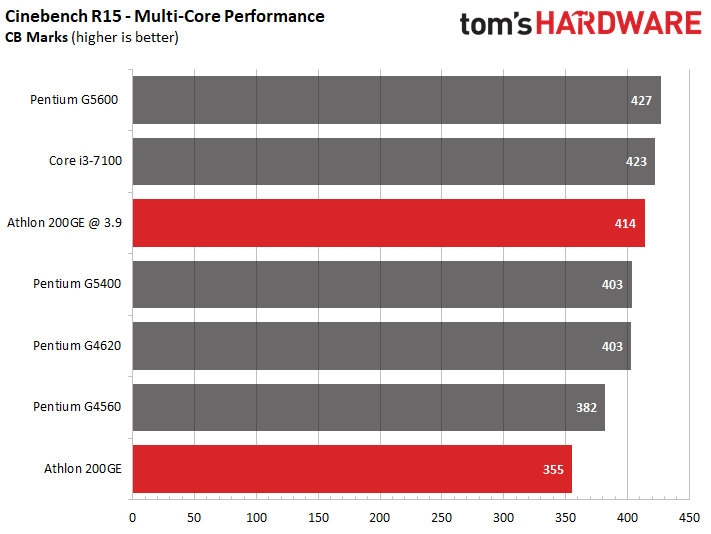Locked AMD Athlon 200GE Overclocked to 4.05GHz With New Asus BIOS (Updated)
UPDATE 12/14/18, 7:45 a.m. PT: TechEpiphany published a video this week showing that Asus has also unlocked the Athlon 200GE, allowing it to be overclocked to 4.05GHz in the YouTuber's testing. That brings the number of manufacturers known to have unlocked AMD's low-end CPU with the 1.0.0.6 AGESA update to three with MSI, Gigabyte and Asus. AMD still doesn't officially support overclocking the processor, but at this rate, it seems like many Athlon 200GE owners will be able to see drastically better performance anyway.
UPDATE 11/30/18, 2:15 p.m. PT: AMD responded to our queries, stating. "AMD has not unlocked and does not officially support overclocking of the Athlon 200GE. It would be best to inquire with MSI regarding BIOS functionality on the company’s motherboard products."
Original Article 11/30/18:
YouTuber TechEpiphany posted a video on Thursday of an overclocked Athlon 200GE, which is surprising because this $55 dual-core, four-thread processor wasn't originally overclockable. The Athlon 200GE comes with a locked multiplier, making it the only non-overclockable, Zen-based model in AMD's fleet. In fact, as a low-end model, it doesn't even support AMD's Precision Boost algorithms that improve performance, instead operating at a static 3.2 GHz clock speed. We followed up with our own testing and currently have the chip running at 3.9 GHz. We have our own test results at the bottom of the article.
TechEpiphany pushed its processor up to 3.8 GHz. Apparently, the latest MSI BIOS that supports the AGESA 1.0.0.6 firmware has inadvertently unlocked the multiplier on the processor. We followed up with our own testing and have the processor at 3.9 GHz with a 1.4 V vCore and 1.15 SoC voltage.
TechEpiphany used an MSI B350M Gaming Pro motherboard with the AGESA 1.0.0.6 BIOS, while we were able to recreate the same conditions with an MSI X470 Gaming M7 AC motherboard. We aren't sure if AMD has intentionally unlocked the Athlon 200GE's multiplier, thus enabling overclocking, or if this is a mistake on MSI's part. We'll update this post if we find out.
AMD's release of the Athlon 200GE earlier this year marked the company's first Zen-based processor to tackle the sub-$100 processor market. That's an important step for AMD because Intel typically dominates this high-volume segment of the market with its Pentium processors.
| Row 0 - Cell 0 | Athlon 200GE | Pentium Gold G5600 | Pentium Gold G5400 | Ryzen 3 1300X | Ryzen 3 2200G | Ryzen 5 2400G |
| TDP | 35W | 54W | 54W | 65W | 65W | 65W |
| Architecture | Zen | Coffee Lake | Coffee Lake | Zen | Zen | Zen |
| Process | 14nm | 14nm++ | 14nm++ | 14nm | 14nm | 14nm |
| Cores / Threads | 2 / 4 | 2 / 4 | 2 / 4 | 4 /4 | 4 / 4 | 4 / 8 |
| Frequency Base / Boost | 3.2 / - | 3.9 / - | 3.7 / - | 3.5 / 3.7 | 3.5 / 3.7 | 3.6 / 3.9 |
| Memory Speed | DDR4-2677 | DDR4-2400 | DDR4-2400 | DDR4-2667 | DDR4-2933 | DDR4-2933 |
| Memory Controller | Dual-Channel | Dual-Channel | Dual-Channel | Dual-Channel | Dual-Channel | Dual-Channel |
| Cache (L3) | 4MB | 4MB | 4MB | 8MB | 4MB | 4MB |
| Integrated Graphics | Radeon Vega 3 (3CU) | UHD Graphics 630 | UHD Graphics 610 | No | Radeon Vega 8 (8CU) | Radeon Vega 11 (11 CU) |
| Unlocked Multiplier | No | No | No | Yes | Yes | Yes |
| MSRP | $55 | $86 | $64 | $124 | $99 | $160 |
We're working to learn more, but enabling overclocking on the processor should change its competitive positioning, especially given its $55 price point. The 35W Athlon 200GE drops into motherboards with the AM4 CPU socket and features the Zen microarchitecture paired with the Radeon Vega graphics engine. The processor has two execution cores and four threads, while the integrated Vega graphics engine comes with three Compute Units (CU). The 200GE's Radeon Vega graphics boost up to 1,000 MHz.
Get Tom's Hardware's best news and in-depth reviews, straight to your inbox.
Single-Threaded Benches
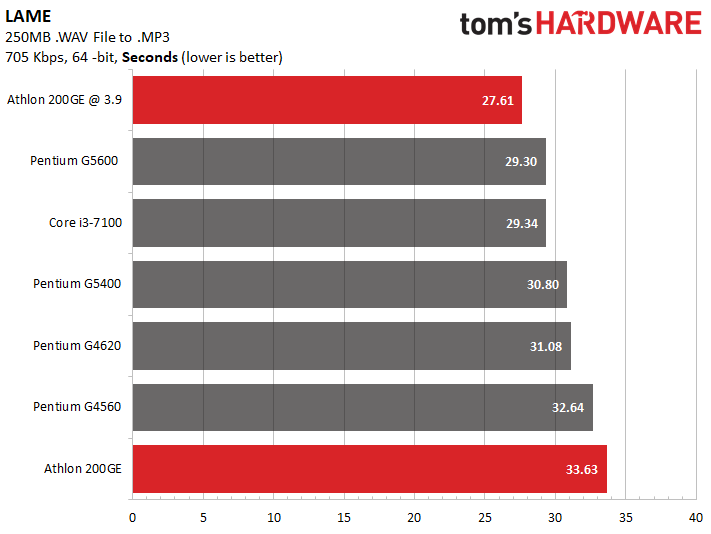
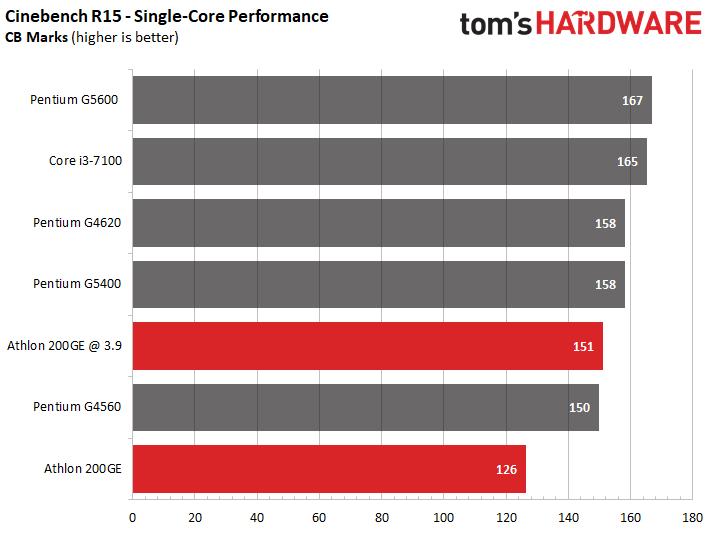
Here we have both a single-threaded Cinebench and a LAME benchmark. Both of these tests are lightly threaded, and as we can see bumping up the frequency to 3.9 GHz improves the Athlon 200GE's standing.
Compression and Decompression
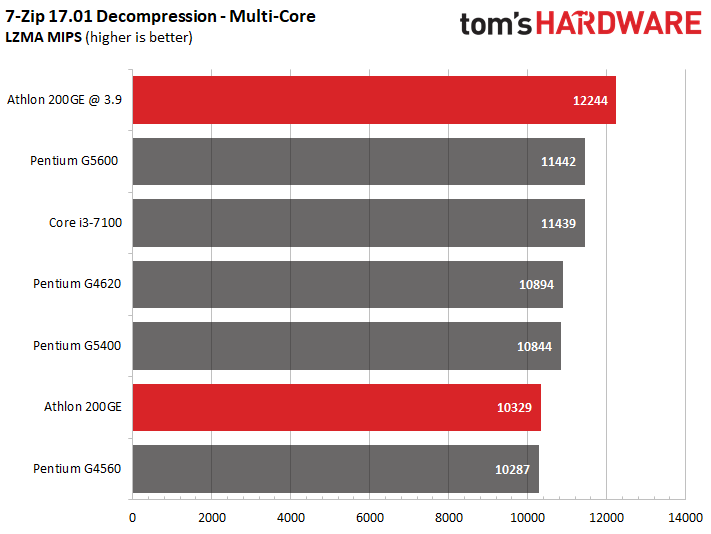
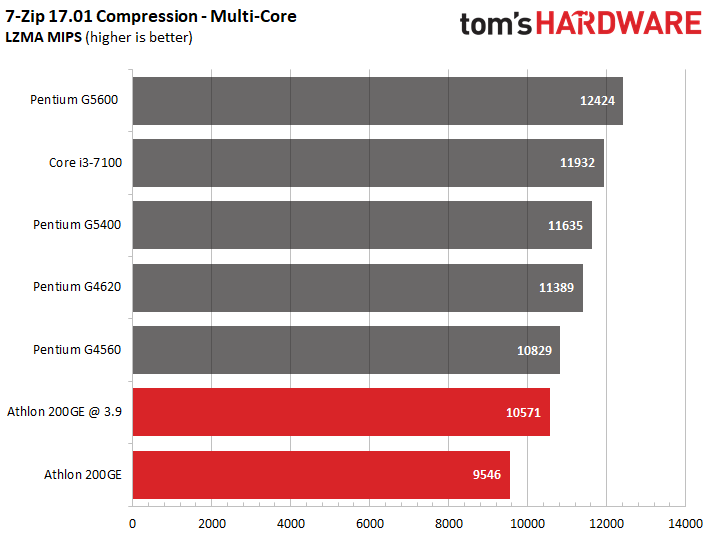
We aren't expecting much of a boost in multi-threaded workloads, like these compression and decompression tests, simply because the 200GE is a dual-core quad-threaded processor. It's encouraging to see the 200G outpace the Intel competitors during the decompression workload.
PCMark 10
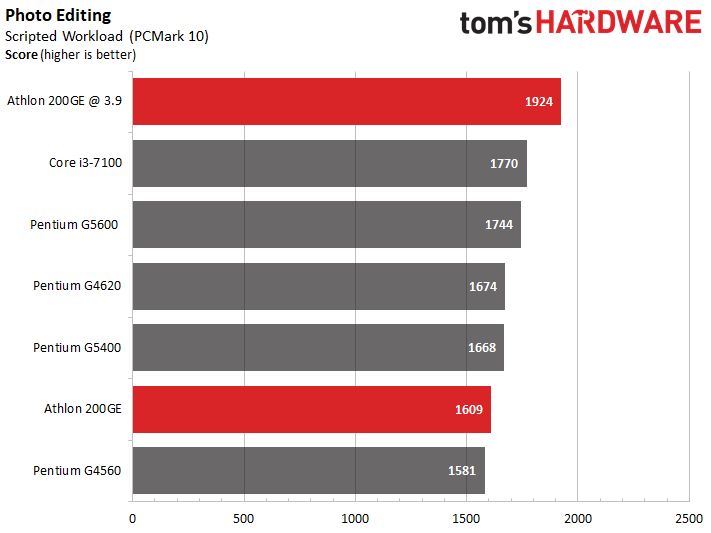
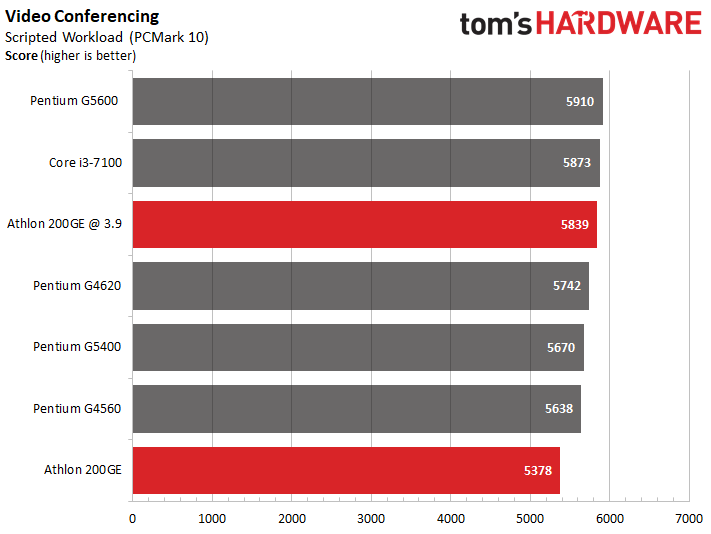
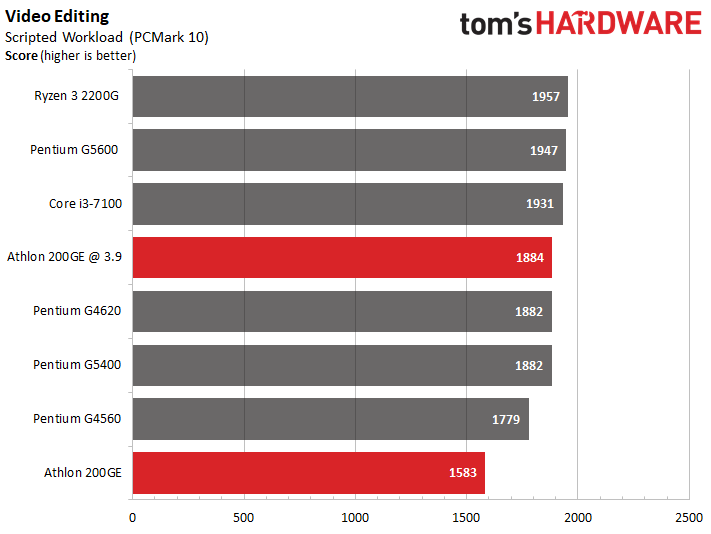
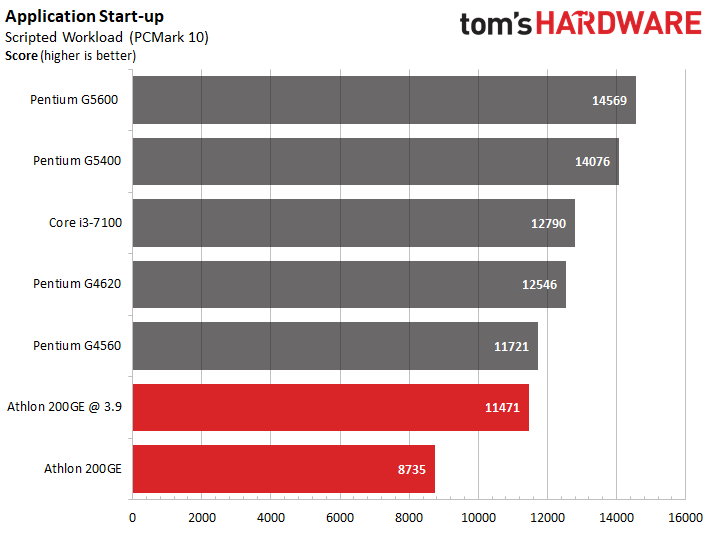
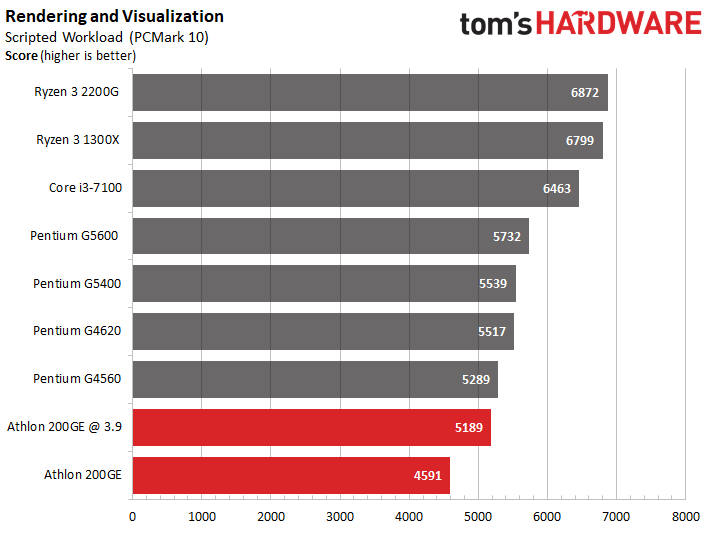
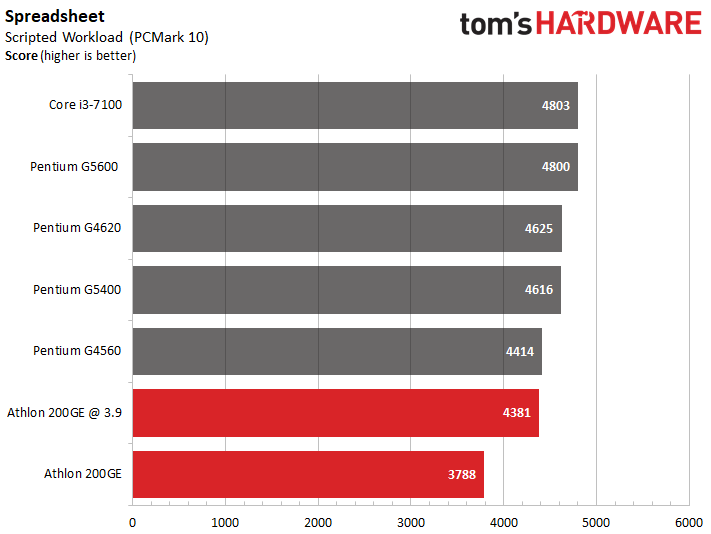
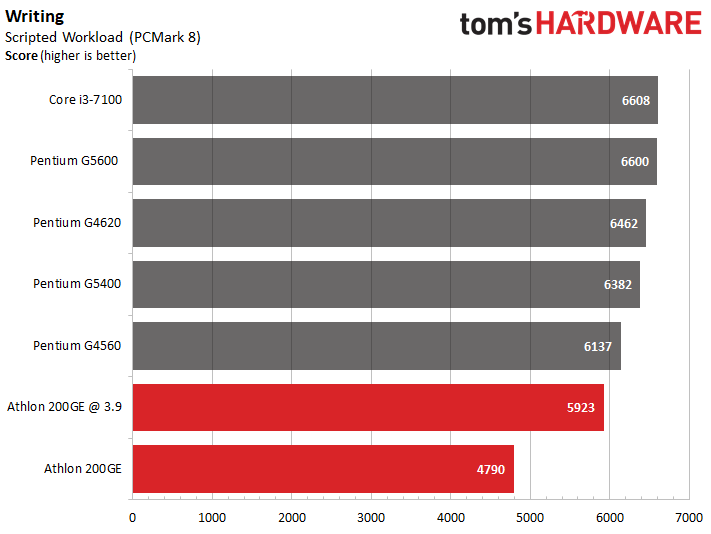
We do see some improvements in PCMark 10 performance, specifically during the photo editing, video conferencing and video editing workloads. It's no coincidence that these are the multi-threaded tests in the PCMark 10 suite. We do see some gains in the remainder of the workloads, but the 200GE still trails the Intel processors in these lightly threaded tasks.

Paul Alcorn is the Editor-in-Chief for Tom's Hardware US. He also writes news and reviews on CPUs, storage, and enterprise hardware.
